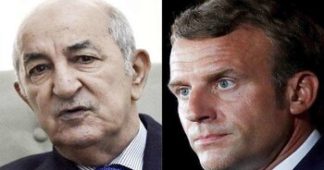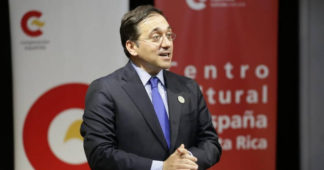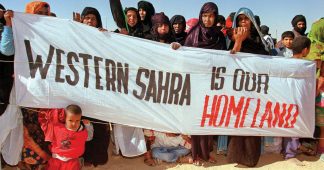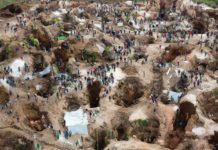by Pavan Kulkarni
April 19, 2025
Both countries have expelled each other’s diplomats as the latest diplomatic row, triggered by the arrest and indictment of an Algerian consular officer in France earlier this month, continues to escalate.
Relations between the North African country Algeria and its former colonizer France have hit one of the lowest points since independence. On Tuesday, April 15, France ordered 12 Algerian diplomats to leave the country and recalled its ambassador from Algeria. Earlier, on Monday, Algeria ordered 12 French diplomats to leave the country within 48 hours, declaring them persona non-grata.
This diplomatic row began on April 8, when the French police arrested three Algerian nationals, including a consular official. Algeria’s Foreign Ministry protested that its “consular officer was arrested in public and then placed in police custody without notification through diplomatic channels and in flagrant violation of the immunities and privileges attached to his duties at the Algerian Consulate.”
On April 11, he was placed in pre-trial detention after the French Anti-Terrorism Prosecutor indicted him as a suspect in the alleged kidnapping of Amir Boukhors last year. Popularly known as Amir DZ to the over a million followers on his social media accounts, he is described in French and other Western media as an “influencer” and “Algerian dissident”.
In Algeria, however, he is on the run from the law, convicted on terror charges for his links to Rachad, an Islamist movement organizing and agitating against the Algerian state from its base in Europe.
Rachad describes itself as a movement seeking fundamental change in Algeria by peaceful means. However, its founders in 2007 included former members of the Islamic Salvation Front (FIS). Founded in 1989 during the democratic opening of the state for multi-party elections, the FIS, which aimed to establish an Islamic Caliphate, was banned in 1991 after the military interrupted the election it was poised to win.
Ghosts from the civil war
Following this, its armed wing, the Islamic Salvation Army (FIA), started a civil war against the Algerian state. One of its splintered offshoots, the Armed Islamic Group (GIA), which was backed by Al Qaeda, carried out several terror attacks including bombing, decapitation of civilians, and the depopulation of entire villages.
The Algerian state, led by the FLN, which had spearheaded the country to independence from France after a prolonged armed struggle, prevailed in the civil war, during which an estimated 150,000 people were killed. FIS members, in exile in Europe after losing the war which ended in 2002, were among the founders of the Rachad in 2007.
In the meantime, the Algerian state had grown increasingly authoritarian. The military continued to wield a disproportionate command over the economy, which was also subjected to increasing neoliberal austerity. Amid a youth unemployment of over 25% and soaring food prices, alleged corruption by the military elite stood out as an eye sore.
Against this backdrop, protests erupted in early 2019 when the then-president, Abdelaziz Bouteflika, announced his candidacy for a fifth term. Known popularly as the Hirak – the Movement – the protests were initiated by progressive forces who by April 9 that year had already forced the army to compel President Abdelaziz Bouteflika to resign. But their demands also included the dissolution of the whole parliament and the drafting of a new constitution empowering a civilian state free from economic and political control of the military elite.
Islamist penetration derailed democratic protests
However, Hirak was soon infiltrated by Rachad, which, amid the protests in April 2019, had mobilized thousands for the funeral of Abbassi Madani, the FIS head, outraging many democratic activists in the movement who held him responsible for the terror attacks in the 1990s.
Despite the continuing weekly protests that were halted only by the COVID-pandemic-induced lockdown in March 2020, the Hirak accomplished little toward addressing the structural issues in Algeria, beyond forcing the resignation of President Bouteflika early on.
“The main reason for this failure is the Islamists. The Rachad movement destroyed the Hirak because, under its pressure, all important questions about the future of Algeria were left aside,” Rachid Ouaissa, director of the Tunis-based Merian Center for Advanced Studies in the Maghreb (MECAM), explained in an interview with the Rosa-Luxemburg-Stiftung.
“The focus was always on the regime—not on the system. But Algeria’s problem is not only the elite, it goes much deeper. Do we want to simply exchange elites, or do we want to question and change the educational and economic system? The Islamists have never questioned the neoliberal structures of the Algerian economy or the crumbling educational system, which is heavily influenced by religion.”
Divisions within the Hirak became apparent after the protests halted during the lockdown, with several democratic activists accusing Rachad of using the former FIS fighters from the civil war to infiltrate the movement in an attempt to provoke violence.
Along with the MAK, another Paris-based organization working for the secession of the Kabylie region on Algeria’s northern coast, Rachad was also designated a terrorist group in May 2021. Already in March that year, when protests resumed after the lockdown was lifted for a few months before the pandemic’s second wave, Algeria had issued international arrest warrants for several Rachad activists, including Boukhors, accusing them of attempting to lead Hirak to violence.
Since 2016, Bourkhors, who has a total of nine international arrest warrants against him, has been living in France which has refused to extradite him, claiming that the charges he faces in Algeria are politically motivated.
Unable to try them in person, a court in Algiers convicted Boukhors and another member of Rachad in December 2022 in absentia, sentencing them to a 20-year prison term. Among the charges against them were “receiving funds from inside and outside the country in order to commit acts targeting the security of the State and the stability of its institutions.”
According to MENA Research Center, a leaked confidential French memorandum had also revealed that the Turkish intelligence had secretly received Rachad cadres, promising them financial and logistical support for its propaganda activities against the Algerian state.
Kidnapped and released without explanation
In April 2024, Boukhors was reportedly abducted from a Parisian suburb by four men impersonating the French police and released the next day without any ransom or explanation. Boukhors claimed he was held in a container and drugged.
A year later, three Algerians including a consular officer were arrested last on April 8 in connection with this kidnapping, indicted, and remanded to pre-trial detention on April 11. Demanding his “immediate release… in order to allow him to defend himself properly and under the most basic conditions”, Algeria’s foreign ministry said that “this judicial turn, unprecedented in the annals of Algerian-French relations, is not the result of chance.” It “comes in a specific context and with the aim of torpedoing the process of reviving bilateral relations.”
The rocky relationship between Algeria and France has accelerated on a downward spiral since last year when France officially condoned Morocco’s illegal occupation of Western Sahara. Algeria, which supports its liberation movement and its people’s UN-recognized representative, the Polisario Front, recalled its ambassador from Paris in protest.
Far-right holds French foreign policy toward Algeria hostage
Relations further soured when Algeria arrested the French-Algerian writer Boualem Sansal late last year after he told a far-right French media that Moroccan territory had been unfairly handed to Algeria by the French at the end of its colonial rule.
Algeria as well as several French analysts maintain that the reason for deteriorating Franco-Algerian relations is the growing clout of the French far-right, which has never recovered from the ‘humiliation’ of France’s defeat in the Algerian war for independence. French Interior Minister Bruno Retailleau of the conservative Republicans party is often seen competing with the far-right to woo the same base.
The Algerian foreign ministry had decried earlier this year that Algeria had “clearly become the battleground for internal French political disputes,” with its far-right “taking French-Algerian relations hostage.”
A revival of bilateral relations seemed to be in the offing when French President Emmanuel Macron and Algerian President Abdelmadjid Tebboune spoke on a phone call on March 31.
“The two presidents had a long, frank, and friendly exchange on the state of bilateral relations and the tensions that have built up in recent months,” according to a joint statement. At Tebboune’s invitation, French Foreign Minister Jean-Noël Barrot visited Algeria on April 6. Two days later, its consular official was arrested.
“Algeria has no intention of letting this situation go unchallenged”
“This unfortunate and unwelcome turn of events proves that some French parties are not driven by the same desire to revitalize bilateral relations,” added the Foreign Ministry’s statement.
“We cannot help but be surprised by the cynical choice made by the gravediggers of the normalization of bilateral relations” who used Boukhors “as the catalyst for this new premeditated action,” it said. “Algeria has no intention of letting this situation go unchallenged, and it will ensure that it fully and resolutely assumes responsibility for the protection of its consular agent.”
We remind our readers that publication of articles on our site does not mean that we agree with what is written. Our policy is to publish anything which we consider of interest, so as to assist our readers in forming their opinions. Sometimes we even publish articles with which we totally disagree, since we believe it is important for our readers to be informed on as wide a spectrum of views as possible.











